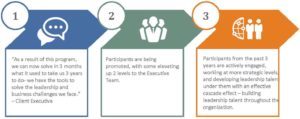“Trust is the glue of life; the most essential ingredient in effective communication; the foundational principle that holds all relationships. Contrary to what people believe, it is not some soft, illusive quality that you either have or you don’t. Trust is a pragmatic, tangible, actionable asset that you can create.” – STEPHEN R. COVEY
Today’s workplace demands collaboration. Research has shown, time after time, that teams of diverse individuals, who create together, debate approaches, test and often fail, eventually succeed. They are better at solving problems, and infinitely more adept at creating new, effective solutions and products, than individuals working alone. What is the magic sauce that enables that kind of innovation, and teamwork? It is trust.
Over 5 years ago, Harvard Business Review published a 10-year longitudinal study on the neuroscience underpinning trust. The study found that trust in the workplace positively impacted everything — from individual company performance to employee recruitment and attrition to higher levels of contribution to the overall economic environment.
Trust has been shown to dramatically accelerate productivity, on all levels. In a high trust culture, motivated employees are given elevated autonomy, which results in powerful levels of motivation and achievement. Up to 64% of respondents in one study would turn down compensation increases in favor of more autonomy and flexibility; and many studies have shown that highly motivated, autonomous teams report up to 50% faster output, and much higher levels of goal attainment.
As Covey has said, trust can be created. What does that require?
- Commitment: Both a commitment to the individual well-being of colleagues, and a commitment to a mission or purpose higher than self-interest, creates trust.
- Consistency: Humans need a sense of regularity, of constancy, of knowing that leaders and colleagues deliver on commitments they make reliably, and in a steady pattern that generates a feeling of security.
- Clarity: People are moved by vision. But the vision must be clear, and able to be summarized in a coherent fashion that makes sense. People must also be able to relate to, and see their role in that vision, to help achieve it and to trust it.
- Compassion: Empathetic leaders who genuinely care for those they lead, and actively show it in consistent words and actions, inspire trust.
- Competence: A culture that prizes, and regularly rewards, life-long learning, development, curiosity, and skills acquisition is a culture that imbues trust. It is also a culture that regularly produces results.
- Connectedness: The post-Covid 19 world is starving for relationships. Leaders and colleagues who ask questions, listen thoughtfully to the answers, remember and acknowledge the details, and care about each other’s thoughts and beliefs create an atmosphere of trust.
High trust cultures have all the characteristics that appeal to most high-performing individuals. Organizations with high trust culture tend to minimize and manage conflict so that time is not wasted, and everyone is respected. They empower innovation, productivity, creativity, and joy.
In this tsunami of workforce change, we cannot emphasize, enough, how important creating a trustworthy culture is. With over 4 decades of expertise in helping companies and people get better and better, The Right Management team stands ready to help you in creating that trusting environment. Call us.






